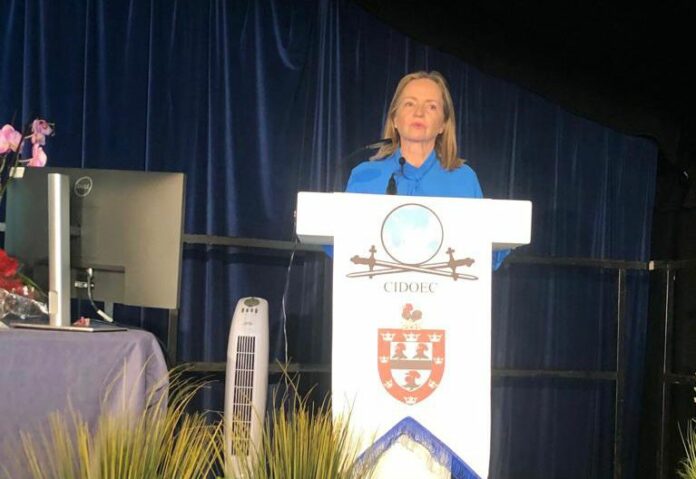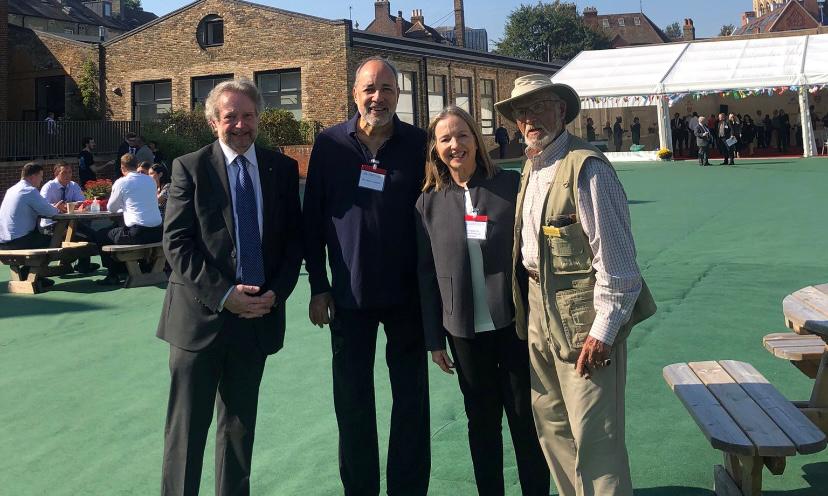 Margarita Woyciechowsky de Tablante
Margarita Woyciechowsky de Tablante
Integrity in journalism serves as a powerful tool to combat secrecy and misinformation propagated by kleptocracies. This was a key topic discussed by journalists from four continents during the 40th edition of the International Symposium on Economic Crimes at the University of Cambridge, which attracted over two thousand delegates from Europe, Latin America, the United States, Asia, and Africa.
The editor of Cuentas Claras Digital, Margarita Woyciechowsky de Tablante, highlighted the significant contribution investigative journalism is making in uncovering the secrets and lies of kleptocratic governments. In her presentation, she condemned the situation in Venezuela, where the rule of law has been replaced by a criminal state.
Below is her speech:
I come from a country, Venezuela, where a communication hegemony prevails, under the control of an autocrat presiding over a false democracy. Although elections have taken place, they have neither been fair, transparent, nor verifiable.
In the absence of democratic institutions, the entire system relies on lies, fake news, and misinformation. For instance, in Venezuela, institutions have ceased to publish real indicators in the economic, social, health, and crime sectors. Consequently, journalists lack official sources to verify data that supports their investigations.
As we all know, democracy is severely undermined by neopopulists and autocrats who are replacing the rule of law with criminal states in many parts of the world. It is evident that democracy is in grave danger, and we all face the challenge of preventing its demise.
The response from journalists and media outlets banding together to investigate and expose the hidden truths of kleptocrats is invaluable. Collaborative efforts have been exemplified in projects like the Panama Papers, Pandora Papers, and the Odebrecht scandal involving a Brazilian construction company whose bribery caused political instability across several Latin American countries.
In our case, the digital platform Cuentas Claras Digital de Venezuela, supported by other media, has published information about the latest corruption scheme within the national oil company, PDVSA, known as the cryptocurrency oil corruption case, which has inflicted economic damage of approximately 10 billion dollars in just two years. Most of that money is unaccounted for and the chances of recovery are slim.
Despite the pressures exerted by financial, commercial, and political interests on journalists, independent and intelligent responses are emerging in many countries, aiming to expose political and economic crimes. The courageous work of journalists who expose autocrats and organized crime deserves recognition, as many have faced persecution, imprisonment, or assassination.
According to Reporters Without Borders, 1,668 journalists have been killed in the last 20 years, and 366 are currently imprisoned, which is the highest number in 30 years. This situation led the United Nations to declare November 2nd as the “International Day to End Impunity for Crimes Against Journalists.”
Maduro against Freedom of Expression: The Information Blackout in Venezuela
Less violent but equally effective means of silencing the press include the forced sale of media outlets to frontmen of autocrats like Maduro, resulting in Venezuela being transformed into an information desert. For instance, the Maduro regime bought, through a frontman known as “the red banker,” two of the country’s most important and popular newspapers. One of them is El Universal, the dean of Venezuelan press. This shadowy transaction involved companies from the UK and Spain. The other major newspaper, El Nacional, faced a different situation. Refusing to sell, El Nacional was subjected to million-dollar lawsuits for allegedly publishing defamatory information against regime representatives. It now publishes online and from abroad due to the exile of its directors and most of its journalists.
Consequently, the Venezuelan population lives in informational deserts, meaning small and medium-sized towns and cities that are not covered by any media outlet or are served only by a few radio stations that exclusively broadcast regime propaganda and music.
All of this results from a systematic strategy executed by Maduro to strengthen the communication hegemony that suffocates Venezuela.
Despite this grim reality, some journalists have formed a network of digital media that work together to investigate and publish information, typically concerning the regime’s corruption and its accomplices. Some of these media directors have had to leave the country due to personal threats but continue to manage their outlets from abroad.
From a global perspective, the issue of fake news is undoubtedly contentious. As Spanish author Javier Cercas states: “It is not that more lies are told today than ever, but that lies have more power to spread today than ever before.”
 Margarita and Carlos Tablante with Prof. Barry Rider and Dr. Saul Froomkin, founders and organizers of the International Symposium on Economic Crimes at the University of Cambridge, UK.
Margarita and Carlos Tablante with Prof. Barry Rider and Dr. Saul Froomkin, founders and organizers of the International Symposium on Economic Crimes at the University of Cambridge, UK.
Social media and artificial intelligence allow us to understand the public’s interests and the types of content they want to see and hear. This concept is referred to as “desired lies.” We embrace information and opinions expressed by our peers—those who think like us—because they align with our beliefs and what we wish to hear. These are the desired lies. Numerous examples exist of autocratic populists who have risen to power and maintained their positions based on desired lies: Trump, Putin, Bolsonaro, Bukele, Maduro, among others.
Today, there are tens of thousands of fake digital media outlets spreading desired lies. In response, many journalists in various countries have organized to create observatories aimed at unmasking these lies, which is a positive development.
Another positive sign in the fight against fake news is the hefty fine imposed on the Fox News channel, which had to admit it lied in support of the falsehoods of a populist like Donald Trump.
Finally, despite the new challenges facing media and journalists with the rise of artificial intelligence, we believe it represents an opportunity that, if well-regulated and properly used, could enhance and facilitate investigative work, especially regarding public affairs, a crucial task for defeating secrecy and fake news—the weapons of kleptocracies.